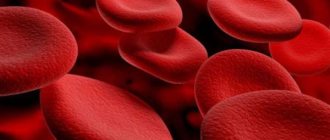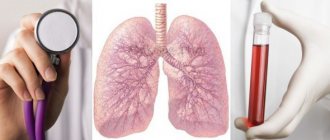Laboratory techniques in oncology occupy an important place in the diagnosis of diseases. A blood test for tumor markers is the first stage of research in patients suspected of developing malignant neoplasms. This simple, painless examination method, which does not require much time, is highly informative. Confirmation or refutation of the tumor process makes it possible to assume the development of pathology and adjust the direction for diagnosis.
Why and when is it prescribed to donate blood for tumor markers and where is the blood taken, on an empty stomach or not?
Blood sampling for a tumor marker is carried out from a vein.
As you probably already understood, a tumor marker is the simplest and fastest method for determining the presence of malignant neoplasms in the body. In view of this, if you wish, you can periodically do such a study for preventive purposes, thereby excluding the occurrence of oncology in yourself. Moreover, it is done completely simply.
You will have to go to a specialized clinic and donate blood from a vein. It must be taken in the morning and on an empty stomach. Remember, you cannot even eat fruits and vegetables before donating blood. Even such harmless food will change the composition of your blood and this will lead to the fact that in the end you will get an inaccurate result.
Blood donation for tumor markers is carried out in order to:
- Confirm or deny the presence of cancer
- Understand whether a malignant or benign tumor develops inside a person
- Understand whether there are already metastases in the body and how much damage they have caused to the body
- Assess how well the body responds to treatment therapy
- Check whether the disease is in remission or has begun to progress again and affect internal organs
- Predict the near future
- Assess whether chemotherapy will be sufficient for the patient or whether surgical intervention will also be required
Preparation for a biochemical blood test for tumor markers: rules for donating blood for tumor markers
Preparing for a biochemical blood test for tumor markers
I would like to clarify right away that a blood test for tumor markers requires the most thorough preparation. If a person does not adhere to generally accepted rules, then in the end the result may not be entirely correct and he will have to do it again. In view of this, if you do not want to end up in such a situation, then adhere to the following recommendations.
So:
- A week before the test, eliminate all junk food from your diet. Avoid crackers, chips, sweet soda, store-bought juices, as well as sausages and smoked fish. All these products contain dyes, artificial flavor enhancers and stabilizers, which, when concentrated in the blood, can greatly affect the final result.
- In addition, before conducting this study, you need to normalize your psycho-emotional state. If you are nervous a lot, the stress hormone will be present in the body in large quantities, which can also affect the final result of the analysis. Therefore, try to have a good rest and get positive emotions before the blood collection procedure.
- Another taboo before donating blood for tumor markers is cigarettes and alcohol. They also need to be completely excluded at least 3 days before the procedure.
- It is also mandatory for both women and men to completely stop taking absolutely all medications, including herbal decoctions, tinctures and teas, 3 days before the procedure.
- The test must be taken between 8 a.m. and noon and always on an empty stomach. The only thing you can afford during this period is a glass of still water, sugar and flavorings.
Some features of the preparatory stage
The rules for preparing for a biochemical blood test depend on what parameters the doctor prescribed for:
- Lipid spectrum and cholesterol levels. Blood is drawn only after 14 hours of fasting. For 15 days, in agreement with the treating doctor, avoid taking medications that affect lipid metabolism. If it is necessary to evaluate the effectiveness of drug therapy, the drugs are not discontinued.
- Urea. For two days, it is advisable to adhere to a certain diet: exclude by-products (kidneys, liver), minimize the intake of meat, fish products, tea and coffee. Physical activity should be moderate.
- Uric acid. A couple of days before the study, follow the recommendations specified in the previous paragraph. In addition, the following medications are subject to mandatory exclusion: antibacterial and sulfa drugs, salicylates, caffeine, vitamin C, thiazole derivatives, theobromine and theophylline.
- Alpha-2-macroglobulin. Before a blood test for this indicator, you should give up meat products for three days.
- A hormone that affects growth factors or anti-Mullerian hormone, glycoprotein or inhibin B. Testing for these hormones is carried out between the third and fifth day of menstruation. Three days before the analysis, physical activity is not recommended. One hour before the test, avoid smoking. During illnesses, especially in the acute phase, it is better not to take the test.
- When preparing for a biochemical blood test for the hormones ACTH and cortisol, it is assumed to exclude alcoholic beverages, physical activity, smoking, stressful situations, taking contraceptive drugs, estrogens and glucocorticoids. The best time to obtain reliable and informative results is no later than two hours after a night's sleep and no later than 10 am.
- Bilirubin. On the eve of the study, do not consume vitamin C and foods that can color the blood serum.
- Sex hormones. The exact time of taking blood for this type of hormone is indicated by a gynecologist, depending on the physiological state of the woman (menopause, pregnancy, menstruation).
- Tests to detect infectious diseases may be false positive. To eliminate doubts, the study is ordered again. For diagnostic purposes, the analysis is carried out before starting treatment with antibiotics. To assess the effectiveness of therapy, blood is taken no earlier than 14 days after completion of the course of treatment.
What are the blood tumor markers for women?
Blood tumor markers for women
To identify female diseases, specific tumor markers are used that help identify female oncology. True, you must remember that they are all very sensitive to the inflammatory process.
Therefore, if there is at least one source of infection in the body, then it is likely that they will show the presence of malignant cells. In view of this, if you want to avoid erroneous results, then first undergo a standard examination and make sure that you do not have chronic diseases, and only then donate blood.
Blood tumor markers for women:
- SA-125. Used to detect ovarian cancer. However, you should take into account that it can record an increase in the level of glycoprotein both in the presence of benign neoplasms and during pregnancy.
- SA-15-3 and MSA. This marker is used to identify malignant tumors in the breast. In addition, it is used to determine the presence or absence of metastases.
- SA-72-4 . This type is used in two cases, if it is necessary to determine the presence of ovarian cancer and make sure that the treatment is chosen correctly and the malignant cells are gradually destroyed.
- HCG - tumor markers. Helps detect uterine cancer. Pathological changes can be noticed at a very early stage. In addition, they are used for re-diagnosis after surgery on uterine tissue.
Types of tumor markers
Proteins differ in properties, each indicator determines the tumor of a specific organ. Species have been discovered that are highly sensitive to processing products of atypical pathogens. Others are considered auxiliary and are used for aggregate analysis.
Based on their origin, the substance is divided into receptors, hormones, enzymes and oncofetal. The last group includes elements that determine oncology in the body. Oncofetal indicators are present in large quantities in the developing embryo. In adulthood, the amount of such substances decreases.
Classification by organ identifies the following types:
- The mammary gland includes CA 15-3 and CEA;
- Male testicles determine VHCG, AFP;
- For female ovaries, CA 125, CA 19-9 are examined;
- Uterine disease is characterized by CA 19-9, CA 125;
- The liver is examined by the AFP indicator;
- Intestinal diseases are determined by the marker CA 19-9, CA 125;
- The skin is examined using the S100;
- The prostate gland is characterized by the protein PSA;
- Bladder oncology is detected by markers TPA, Cyfra 21-1;
- The pancreas is determined by the substances CA 19-9, CA 72-4.
Women should be careful about their own health. It is recommended to undergo a routine examination by a gynecologist every 6 months. The female body is considered difficult to diagnose a malignant tumor. In the presence of a neoplasm in the uterine or vaginal area, an antigen is detected that characterizes oncology in the tissues of the uterus.
For women, doctors have identified a separate group of tumor markers:
- Cancer antigen CA 125 is often used;
- The SCC indicator is considered accurate;
- Highly sensitive include CA 15-3, HE 4;
- MSA, CA 72-4 are used to clarify the diagnosis;
- CA 19-9 is able to detect the disease in its development stage;
- AFP - alpha-fetoprotein - one of the first discovered types;
- Cancer antigen 27-29;
- REA is considered the best and most effective.
In some cases, laboratory assistants offer patients the entire list of tumor markers for research. The person agrees without thinking about the need. The list of cancer antigens is quite impressive. Only a doctor has the right to choose the right one; you should not prescribe tests for yourself.
What are the blood tumor markers for men?
Blood tumor markers for men
All of the tumor markers mentioned below, if used correctly, will help you identify the presence of malignant cells in the body 1-2 months before they can be detected by more familiar diagnostic methods.
Therefore, if you have any unpleasant symptoms, immediately consult a doctor and get tested. If you do this at an early stage, then with a high probability we can say that the cancer disease will be suppressed even before it causes serious harm to the body.
Blood tumor markers for men:
- AFP . It will help determine the presence of pathological processes in the male testicles. In addition, this marker is able to detect cirrhosis and hepatitis processes, even if they are very hidden and do not yet affect the functioning of the liver.
- PSA. A male tumor marker that is used to diagnose prostate cancer. It also quite well determines the presence of a chronic inflammatory process in this area, which makes it possible to carry out treatment even before the pathology becomes oncological.
- sPSA. Suitable for detecting prostate cancer, as well as for conducting research for preventive purposes. It is also very often used to determine the level of prostate antigen. If these indicators increase noticeably, this may indicate the development of oncology.
CA 125 level is elevated - reasons
Elevated CA-125 is observed in the case of epithelial carcinoma of the ovary and adenocarcinoma of the endometrium of the uterus, as well as fallopian tubes. In case of malignant tumors of the ovaries and endometrium, the specific tumor marker CA 125 may be elevated in case of tumor progression or an inadequate response to antitumor therapy. A decrease in the level of tumor markers CA 125 indicates a favorable prognosis and an adequate response to treatment. If the level of CA 125 is exceeded during remission, then this is the basis for conducting an in-depth examination of the patient for relapse of the disease.
A high level of CA 125 is observed in one percent of completely healthy individuals and in six percent of patients with diagnosed benign neoplasms. As observation shows, sometimes the ovaries may not be involved in the pathological process. CA 125 is elevated in some patients suffering from neoplastic tumors - lung or pancreatic carcinoma.
CA125 levels may also increase in liver cirrhosis, since it, like other glycoproteins, is neutralized there. The result of a study of the level of tumor marker CA 125 may be elevated in the following oncological diseases:
- in eighty percent of ovarian cancer cases;
- for cancer of the uterus and endometrium;
- in case of malignant neoplasm of the fallopian tubes;
- with adenocarcinoma or other histological type of breast cancer;
- in the case of neoplastic processes in the digestive organs - stomach, liver, rectum;
- for lung cancer.
What tumor markers should I donate blood for prevention, general ones?
Tumor markers for prevention
As you probably already understood, each malignant disease secretes a specific protein, which accumulates in the body. Therefore, if you periodically donate blood for analysis, then a fatal pathology can be detected very early.
This can be done using the following tumor markers:
- AFP (liver, gall, rectal, ovarian cancer)
- Beta-2 microglobulin (leukemia, lymphoma, myeloma)
- CEA (prostate, lung, stomach, breast, intestinal cancer)
- CA 19-9 (pancreatic, stomach, intestinal and liver cancer)
- HE4 (ovarian, throat, lung cancer)
Types and norms
Depending on the origin, tumor markers are:
- tumor cell antigens;
- antibodies to tumor cells;
- blood plasma proteins;
- hormones;
- decomposition products new occurrences;
- enzymes produced during the process of material metabolism in the tumor.
Depending on how different tumor markers are from substances produced by non-tumor tissues, they are divided into 2 types:
- Very clearly visible (tumor-specific) tumor markers produced by the neoplasm itself. In a healthy human body they are absent, since they are not produced by healthy cells. The discovery of such structures in the blood, even in small quantities, is considered an alarming signal.
- Quantitatively released - substances that are present in a low density in the body of a healthy person. The formation of a tumor process is indicated by a sudden increase in their number in the blood.
These structures are also distinguished by some specificity, in other words, they may indicate damage to certain organs:
- Calcitonin is a marker of medullary thyroid cancer. For children under six months of age, the normal content of this hormone is up to 40 picograms in 1 milliliter of blood, for children from 6 months to 3 years - up to 15 picograms, for the stronger sex - up to 12 picograms, for the fair sex - up to 5 picograms.
- Prostatic extraordinary antigen (PSA) is a marker of prostate disease. The norm for the stronger sex up to 40 years old is up to 2.5 nanograms per milliliter of blood, over 40 years old – up to 4 nanograms.
- Cyfra CA 21-1 (cytokeratin 19 fragment) – characteristic of lung cancer. The norm is up to 3.3 nanograms in 1 milliliter of blood.
- Alpha fetoprotein (AFP) – begins to increase in liver, testicular or ovarian cancer. It is detected in minimal quantities in pregnant women. A value of up to 15 nanograms in 1 milliliter of blood is considered normal.
- Beta-chorionic gonadotropin (beta-hCG) - may indicate chorionepithelioma, hydatidiform mole. In addition to blood, urine is used as the test material. Values of up to 5 international units in 1 milliliter of blood are considered normal.
- Beta-2-microglobulin - becomes larger with leukemia (damages of the hematopoietic system, in other words, blood cancer). Determined in blood, urine, cerebrospinal fluid. The norm is values within the range of 1-2.4 milligrams per 1 liter of blood.
- Tumor-M2-pyruvate kinase (PK-M2) - used in the early diagnosis of colon or rectal cancer. Apart from blood, feces are used for diagnosis. The normal content of the substance in the blood is up to 15 units of action in 1 milliliter.
- Carcinoembryonic antigen (CEA) – increased in colon or ovarian cancer. This may also indicate damage to the thyroid or mammary glands, lungs, liver, pancreas, bladder, or cervix. The norm is up to 3 nanograms per 1 milliliter of blood.
- CA 15-3 – stands for cancer antigen or cancer antigen 15-3. considered a marker of breast cancer. Values up to 28 units per 1 milliliter of the test liquid are considered normal.
- CA 19-9 - begins to increase with oncology of the stomach, pancreas , gallbladder and ducts. The norm is up to 37 units in 1 milliliter of blood.
- CA 50 - studied for liver cirrhosis and pancreatic carcinoma. The upper limits of normal are 23 units per 1 milliliter of blood.
- CA 72-4 is a marker for stomach cancer, also used in the diagnosis of tumors of the ovaries, mammary glands, endometrium, pancreas, colon, and lungs. Normal values are up to 6.9 units per 1 milliliter of blood.
- CA 125 - indicates ovarian damage. The norm is up to 35 units in 1 milliliter of blood .
- CA 242 - signals the possibility of the formation of cancer of the pancreas, stomach, and colon. The norm is up to 20 units per 1 milliliter of blood.
- CA 549 - begins to increase in breast carcinoma. Normal limits are up to 11 units in 1 milliliter of blood.
- Tumor marker HE 4 (human epididymal protein) – indicates ovarian cancer. The norm for the fair sex up to fifty years of age is up to 60 picomoles per 1 liter of blood , in postmenopause – up to 140 picomoles.
- Antigen for squamous cell carcinoma (SCC) - may indicate the formation of cancer of the cervix, auditory organs, nasopharynx, and esophagus. Indicators of up to 2.5 nanograms per 1 milliliter of blood are considered normal.
- Neuron-original enolase (NSE) - begins to increase in small cell lung carcinoma, and in addition to everything in tumors of neuroectodermal or neuroendocrine origin, neuroblastoma. The norm is up to 12.5 nanograms in 1 milliliter of blood .
- Tissue polypeptide antigen (TPA) - detected in carcinoma of the bladder, breast, cervix, bronchi, and colorectal intestine. Normally, the sign will not be much more than 85-120 units per 1 milliliter of blood.
- Protein S-100 is a tumor marker that is sensitive to melanoma (skin cancer). The norm is not higher than 0.105 micrograms per 1 liter of blood. A false positive result is possible with diseases of the heart or nervous system.
- Chromogranin A - an increase in the level of this protein indicates neuroendocrine neoplasms. The norm is up to 4.5 millimoles per 1 liter of blood.
Where can I get a blood test for tumor markers?
It is best to donate blood for tumor markers in specialized clinics
. If you decide to take a blood test for tumor markers, then try to find a clinic that has the necessary equipment and a qualified specialist who can decipher the results. Of course, ideally, it is best to conduct such a study in specialized oncology clinics, where there are specialized specialists who understand all the intricacies and nuances of this analysis.
In this case, you will probably be able to get the correct diagnosis the first time and you will not have to waste time on additional research. Moreover, most people, after taking a blood test for tumor markers in municipal clinics, end up going to specialized clinics anyway. So don’t waste your precious time and go there right away.
HE4
To clarify the diagnosis, the doctor may ask the woman to undergo additional tests. One of these is HE4. We are talking about a protein that is part of the WFDC protein group. Localization of the substance is the epithelium in the accessory part of the ovaries. It is responsible for activating the process of sperm action, anti-inflammatory effect and protection against microbes.
The marker is intensively produced when the ovaries are affected by oncology. It increases in volume and spreads into various biological fluids. The examination is prescribed in combination with CA-125.
Blood test for tumor markers: what does the tumor marker CA, NSE, S100 show?
Tumor marker NSE
- The SA tumor marker is very sensitive, so it can easily detect a large number of different malignant cells. For example, it can be used to detect breast, ovarian, gastrointestinal, bladder and liver cancer.
- The tumor marker NSE is found in small quantities in many tissues of the body. Thanks to it, pancreatic and thyroid cancer, lung cancer, neuroblastoma and retinoblastoma can be easily detected.
- The S100 tumor marker is most often used to identify and treat melanoma. In addition, it can determine the level of damage to the nervous system and cerebral cortex in the post-traumatic period.
How long does it take to test blood for tumor markers?
A blood test for tumor markers is done for at least 24 hours.
As for how long a blood test for tumor markers is done, it all depends on the level of the clinic and its workload. If you take the test in a clinic with good equipment, you will be able to get the test result within 24 hours. If it is a municipal medical institution, then this may take even 2 weeks.
As a rule, small clinics do not perform such tests on site, but send them to specialized clinics. And this is precisely the reason why the analysis takes so long. But still, if you live in a fairly large city, you can get the result of such a study within 2-5 days.
How long to wait for the result?
On average, it takes from 1 day to 10 days to obtain the result of each of the listed tumor markers. When the analysis information is ready, the data is sent to the attending physician. After reviewing the results of the study, the specialist can prescribe adequate therapy or give recommendations on the need for additional diagnostic measures in order to clarify the expected diagnosis.
It is important to understand that sometimes such tests give false results, and if the doctor doubts the reliability of the study, he will certainly advise repeating the procedure.
How often should you donate blood for tumor markers?
It is advisable to donate blood for tumor markers once every 1-2 years.
If we talk about how often you need to donate blood for tumor markers, then this should be done taking into account your age and health status.
So:
- If you have sick relatives, you need to undergo examination 1-2 times a year
- If you are completely healthy, then you can do this once every 2 years.
- Women and men over 50 years of age must be tested every year.
- People cured of cancer in the first year need to be tested every 2-3 months, and for the next 5 years, every six months
Preparing and conducting analysis
A blood test for tumor markers in women and men takes the form of a blood donation. You need to donate blood in the morning, preferably on an empty stomach.
It is better for women not to test for tumor markers during their menstrual periods, since the data obtained during this period of time may turn out to be false. Before the examination, you need to stop smoking and not engage in physical activity. Also, before taking the test, you need to know that some examinations may influence its outcome.
Therefore, before conducting a blood test, it is necessary to exclude the following diagnostic methods:
- X-ray examination;
- taking a smear;
- Ultrasound;
- biopsy;
- bronchoscopy examination.
To get an accurate tumor marker result, it needs to be carried out at specific time intervals. The healthcare organization recommends specialized schemes for donating blood for tumor markers to monitor a person’s condition:
- People aged 30-40 years must take this test completely healthy to determine the exact value. Next, you need to take an analysis at the recommended period (once every six months, once every 3 years) and compare the result with the first analysis. If there is no such data, then you will need to do 2 examinations with an interval of 1 month. and find out the average and see if their numbers melt. If it grows and becomes higher than the first values, it means that a malignant formation may appear in one of the organs.
- If the marker concentration increases, then the examination must be repeated after 14 days. If, based on the results of a repeated examination, the result is the same, then this indicates the presence of a formation in the body, so several additional tests are required.
- After the procedure to remove a malignant tumor, an analysis should be performed 7 days after the end of therapy.
- Further examination should be carried out after 2 months. for 2 years.
- Additionally, the number of tumor markers should be checked before any change in therapy. Specific markers and their number in this case will be basic, but it is with them that all further results must be compared. If the number of markers becomes lower, then the treatment helps, and if they remain at the same level, then the treatment does not work and another regimen is required.
- If metastases are suspected, it is necessary to determine the number of tumor markers in the blood and compare them with those that were present on the 7th day after therapy. If the number of tumor markers has increased, this indicates metastases that have not been destroyed.
Is it possible to donate blood for tumor markers during menstruation?
You cannot donate blood for tumor markers during menstruation.
Above, we already told you about factors that can affect the result of the study, but we did not mention such a physiological phenomenon as menstruation. Remember, during menstruation you should never give blood for analysis as this can greatly distort the result.
Firstly, during menstruation, a woman’s uterine tissue becomes inflamed, and because of this, the levels of some specific tumor markers may increase. Secondly, during this period hormonal levels fluctuate greatly, which can also provoke a similar problem. In view of this, it will be better if you donate blood for analysis 2-4 days after the spotting has completely disappeared.
What does CA 125 mean?
Tumor marker CA 125 is a specific marker that helps diagnose ovarian cancer pathology at the earliest stage.
Important! The threshold or discriminatory level of CA 125 in the blood plasma of women is up to 35 units/ml. In healthy men (average) – up to 10 units/ml. CA 125 is a complex compound of protein and polysaccharide
CA 125 is a complex compound of protein and polysaccharide.
It is an antigen of a certain type of epithelium (fetal tissue), but is present normally:
- In the tissue of the unchanged endometrium and uterine cavity in the composition of mucinous and serous fluids, but never enters the blood plasma while maintaining biological barriers.
- Minimal amounts of CA 125 are produced by the mesothelial lining of the pleura and peritoneum, the epithelium of the pericardium, bronchi, testes, fallopian tubes, gall bladder, intestines, pancreas, stomach, bronchi, and kidneys.
- An increase in the level of discrimination in women is possible in the first trimester of pregnancy and during menstruation.
How much does it cost to donate blood for tumor markers: price
Cost of tumor markers
In principle, if you donate blood for tumor markers in a municipal clinic, then it is likely that the cost of this study will be paid by the state, provided, of course, that you have a health insurance policy.
If you choose a private clinic, then everything will depend on the cost of the reagents that will be used to determine the state of your health. As practice shows, in such institutions the cost of research starts from 500 rubles.











